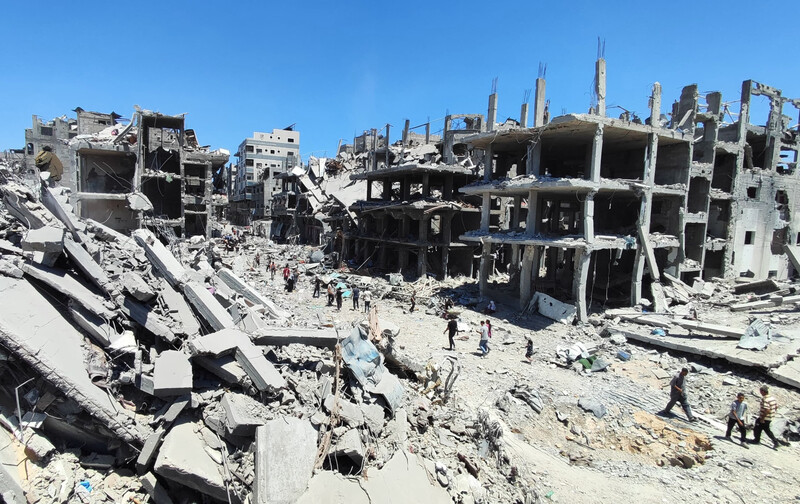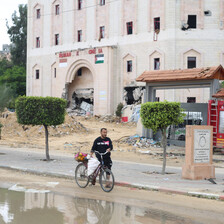The Electronic Intifada 20 June 2024

Massive destruction in Jabaliya refugee camp, northern Gaza.
APA imagesIt took Walid Ribhi a long time to find the place where his parents used to live. Everything around it had been obliterated.
Walid needed help from neighbors sitting in the rubble of their former homes to locate what he was looking for.
The sight was shocking. There was no trace of his parent’s two-story building.
All the other houses in the area were gone, too.
“It was as if a hurricane hit the area and swallowed up all the buildings,” Walid said.
Leaving the area where his parents had their home, Walid searched for a school in which he had taken shelter during the current war.
He recognized the school only from a sign at its gate. The school and five others nearby had all been destroyed or badly damaged.
The scene at the market in the heart of Jabaliya was particularly eerie.
Walid used to run a clothes shop in the market. When he realized that it and so much else was in ruins, Walid started to weep.
It was not the first time that he had been put out of business.
Walid previously had a store in al-Rimal, a Gaza City district. It was located in the Shorouq tower, which Israel bombed during the May 2021 attack on Gaza.
Before the current war, Walid had an apartment in Beit Lahiya, northern Gaza. As it was destroyed during the first few weeks of the war, Walid moved to his parents’ home in Jabaliya.
His parents had evacuated their home and moved southwards.
Walid, his wife and their three children remained in Jabaliya throughout Israel’s ground invasion of the camp during November. Although Israeli troops had come very close to the house, the building stayed intact.
Israeli troops eventually withdrew from Jabaliya following that invasion. They re-entered the camp last month.
For Walid and his family, the May invasion was worse than anything they had ever experienced.
About a week after the May invasion began, Israel bombarded nearby houses. The violence seemed far more intense than it had been in November.
Fearing they would die, Walid and his family embraced each other and recited the shahada – a Muslim’s final testament before God.
“When the bombardment stopped, we opened our eyes and thanked God we were still alive,” Walid said.
Bloodbath
A day later, the Israeli military shelled the neighborhood. The military approached the area in which Walid was living, driving tanks and bulldozers.
Under attack from both the air and the ground, the family fled to a school run by the UN agency for Palestine refugees (UNRWA).
It was not safe at all.
A few days later, the Israeli military penetrated the heart of the camp, inflicting massive destruction.
Walid and his family decided to leave the school. Before they could get out, the Israelis shelled it.
The family hid until they found an exit.
As they fled, Walid saw makeshift tents being attacked with people still inside them.
“Their voices are still stuck inside my head,” he said. “Those voices chase me all the time, whether I am awake or asleep.”
“I am still shocked that an UNRWA school, which is supposed to be protected by international law, turned into a bloodbath.”
The family did not know where to go.
Before their eyes, a group of people was shot by a missile fired from a drone. The three people who rushed to aid the victims were themselves shelled.
Two of the three managed to survive. One was left to bleed.
The family kept walking, with the children becoming distressed by the numerous dead bodies they saw on the ground.
Eventually, the family found themselves near a school in the south of Jabaliya. After a week of sheltering there, they were woken up at night.
The sound they heard was that of the school being shelled.
Once again, they fled to another school – this one in the west of Gaza. It was the last place they took shelter before the Israeli troops withdrew from Jabaliya.
Once the withdrawal was confirmed by the authorities in Gaza, the family opted to come back and see Jabaliya.
Nothing could prepare Walid for the terrible scene that awaited him.
Despite being stunned, Walid pitched a tent and pledged to stay in Jabaliya.
“I know the wells and the solar panels were destroyed,” he said.
“But we are working to get water and electricity. We will find a solution.”
Khuloud Rabah Sulaiman is a journalist living in Gaza.





